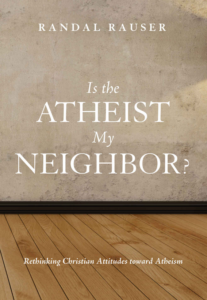Book Review: Is The Atheist My Neighbor?

In his book Is the Atheist My Neighbor? Rethinking Christian Attitudes toward Atheism, analytic theologian Randal Rauser investigates common prejudices Christians hold about atheists. At the same time, he does a good job of displaying a capacity for logic and reason, which upends the one-dimensional assumptions that far too many atheists possess about the way they believe religious people think.
The introduction effectively summarizes the entire work’s tone and approach by presenting a modernized “Good Samaritan” parable. Rauser’s version subverts conventional expectations by portraying Christians as callous and an atheist passerby as a compassionate, ethical individual who helps someone in need.
In short, this book conveys an appreciation of the atheist perspective (although it is a perspective with which Rauser fundamentally disagrees). It unpacks the nature of beliefs that reduce atheists to wayward caricatures and it demonstrates a Christian humanism that strips away stereotypes to honor the humanity of those who reject god beliefs.
In the first chapter, Rauser details just how pervasive uncharitable views of atheists are within Christian culture. Rauser declares that atheists have assumed the mantle of the despised and distrusted social pariah on the margins. He makes sure to criticize the Christian film industry and in particular, the film God’s Not Dead, for its embarrassingly absurd and perverted view of atheist viewpoints. Judging the sentiment he shares, Rauser would no doubt commend Neil Carter’s assessment of the movie in his article “What I Learned about Atheists from God’s Not Dead.”
Rauser surmises this widespread hostility amongst Christians towards atheists is due to the “Rebellion Thesis,” which he defines as:
While atheists profess to believe that God does not exist, this disbelief is the result of an active and culpable suppression of an innate disposition to believe in God which is borne of a hatred of God and a desire to sin with impunity.
Rauser does an excellent job of clarifying what the Rebellion Thesis is in the second chapter by offering real-world examples that track the usage of this proposition within Protestant history from the 1600s to present-day. By breaking down the doctrine of influential historical and contemporary Christian voices, Rauser shows his readers how ideas like atheists being worse than demons or atheists being vermin have been preserved and stoked throughout history to leave us with the normalized misperception that atheists are unreasonably immoral creatures and that atheism has negative social consequences.
Rauser also remarks that he is disheartened to see how often Christians make indefensibly sweeping statements regarding the beliefs of all atheists or agnostics on the strength of personal subjective opinion rather than justifiable evidence.
The third chapter is perhaps my favorite chapter. Here Rauser provides a comprehensive refutation of the Rebellion Thesis based on interpretations of Psalm 14:1 (Psalm 53:1), Ephesians 2:12, and Romans 1:18-21. In his probing analysis, Rauser uses sociohistorical evidence to demonstrate how popular interpretations of these scriptures are mistaken. Further, he wields both formal and informal logic to establish that a combination of fallacious quote-mining and illicit conversion support the Rebellion Thesis.
Atheists may disagree with a few points of explanation but will (in all likelihood) appreciate Rauser’s overall argument’s picking apart the Biblical text that fuels unwarranted tropes and assumptions about those who don’t embrace faith. I especially appreciate this chapter because it was a great reminder that despite my exhaustive research of Christian history (which ultimately led to my deconversion), I still don’t know everything. Rauser’s delivery of fascinating cultural context is educational and successfully concludes that the implications of the Rebellion Thesis are untenable.
Chapter Four gives the reader an extended conversation with atheist writer Jeffery Lowder. The goal of the chapter is to demystify the atheist worldview and humanize those who are frequently demonized. This chapter is impressive for two reasons: one, the discussion grants a platform to someone whose belief system opposes the author; two, by allowing Lowder’s explanations space to exist without attempting to engage in apologetics, Rauser facilitates steel man arguments for philosophical naturalism.
Chapter Five focuses mainly on quotes made by Christopher Hitchens and Thomas Nagel that Christians cite as being proof of the Rebellion Thesis. Rauser approaches these statements with added context and charitably steel man’s and sympathizes with the atheist point of view. He ends this chapter by admonishing the use of quote-mining to make hasty generalizations of atheism.
He concludes the book in the sixth chapter with an appeal for Christians to approach atheists with hospitality and not misplaced hostility. He highlights the power of validating, and thus making space for, those who are exempt from mainstream acceptance. Rauser emphasizes:
When Christians extend hospitality to the atheist, they are reaching out not merely to a stranger, but to a person who may have suffered much for their convictions, and who could have many insights to share from their experiences.
He concludes by providing practical action steps forward for Christians to engage atheists as neighbors.
This brief (only 97 pages) but thorough book is worth reading, dissecting, and recommending to others. I think it does a great job of presenting atheists as complex beings worth respect and capable of leading ethical lives despite placing no stock in the god hypothesis. By providing mindful, well-researched, and cogent deconstructions of typical Christian claims that negatively characterize nonbelievers, I would say Is the Atheist My Neighbor? is a must-read for both Christians and atheists alike, as we could all benefit from Rauser’s incisive, humanistic rethinking of Christian attitudes toward atheism.
